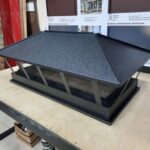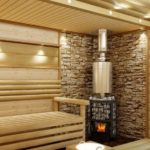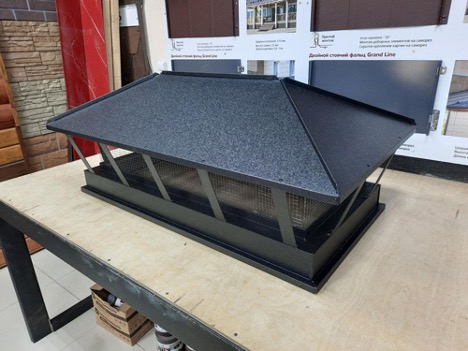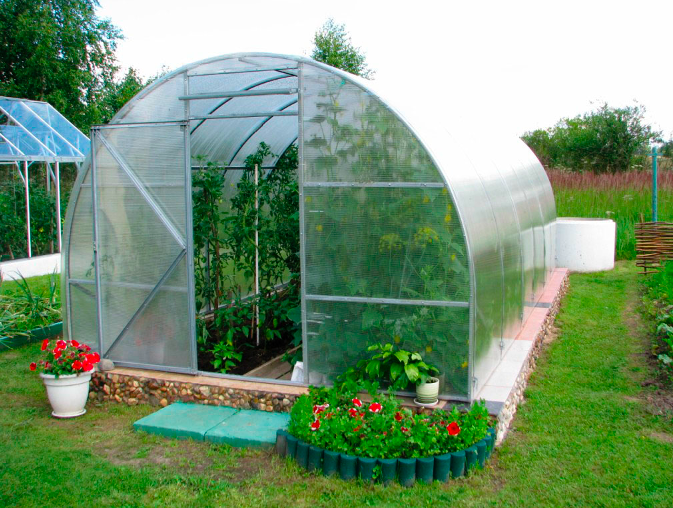Cast iron, steel, wood-burning stove for a bath: which one to choose, pros and cons
The choice between a cast iron or steel sauna stove is a key point when planning sauna procedures. Cast iron and steel stoves have their own unique characteristics, and understanding their differences will help you make the right choice.
Cast iron stoves are known for their ability to retain heat for a long time and distribute it evenly. They are more resistant to corrosion and have a long service life. Steel stoves, on the other hand, heat up and cool faster, making them easier to use, but they may be less durable than cast iron stoves.
The content of the article
- Which sauna stove is better: steel or cast iron
- Sauna stove: cast iron or metal
- Stainless steel sauna stove: pros and cons
- Which sauna stove, cast iron or steel, to choose: selection criteria
- The best cast iron sauna stove: what to consider
- Wood-burning sauna stove cast iron or steel: comparison
- Cast iron for a heater in a bathhouse: features of choice
- Conclusion
Which sauna stove is better: steel or cast iron
When choosing between a steel and cast iron sauna stove, you should consider the following aspects:
- Cast iron stoves have a high heat capacity, which allows them to retain heat longer.
- Steel stoves heat the room faster, which can be convenient if the bathhouse is used frequently.
- Cast iron is generally more resistant to corrosion and wear, resulting in a longer service life.
- Steel stoves are usually more affordable, but may have a shorter lifespan.
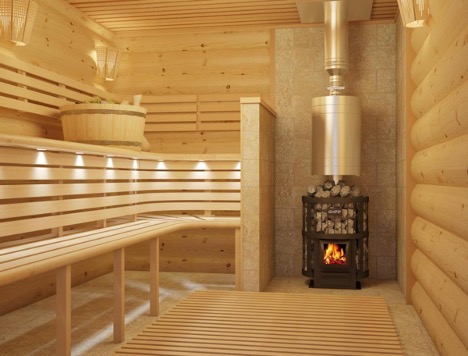
Sauna stove: cast iron or metal
When choosing a stove for a bath made of cast iron or metal, it is worth considering the operating conditions. Cast iron is better suited for long sessions and large baths, where long-term heat retention is important. Steel stoves are better suited for small baths or where quick heating is needed.
Stainless steel sauna stove: pros and cons
A sauna stove made of stainless steel, or “stainless steel,” is a modern and practical option for heating a sauna. Here are the main pros and cons of such ovens:
Advantages of a stainless steel sauna stove:
- The main advantage of stainless steel is its high resistance to rust and corrosion, which is especially important in conditions of high humidity in the bath.
- Due to their resistance to corrosion, stainless steel stoves have a long service life.
- Stainless steel has a modern and aesthetically pleasing appearance that can pair well with a variety of bathhouse interior styles.
- The stainless steel surface is easy to clean and keep clean.
- The smooth surface of stainless steel does not give bacteria and mold the opportunity to reproduce.
Disadvantages of a stainless steel sauna stove:
- Stainless steel stoves are usually more expensive than their cast iron or regular steel counterparts;
- Stainless steel heats up quickly, but also cools down quickly, which can be uncomfortable for long sauna sessions;
- Despite its strength, the surface of stainless steel can be scratched and deformed upon impact;
- Stainless steel has a higher thermal conductivity than cast iron, which can make the outside of the stove feel hotter to the touch.
In general, the choice of a stainless steel sauna stove should be based on comparing these pros and cons with personal preferences and requirements for functionality and design.
Which sauna stove, cast iron or steel, to choose: selection criteria
Determining which stove to choose, cast iron or steel, depends on several factors. It is important to consider the size of the sauna, frequency of use, heating time preferences, and budget. Here are the main selection criteria:
- Cast iron stoves are better suited for large baths due to their ability to retain heat for a long time.
- If the sauna is used regularly and needs to heat up quickly, a steel stove will be more preferable.
- Cast iron stoves are typically more expensive than steel stoves, but their durability can make the initial cost worth it in the long run.
The best cast iron sauna stove: what to consider
When choosing the best cast iron sauna stove, you should pay attention to such points as the quality of cast iron, the presence of an air cooling system, the ability to adjust the draft and ease of use. Cast iron has a high heat capacity and durability, making it an excellent choice for a sauna stove.
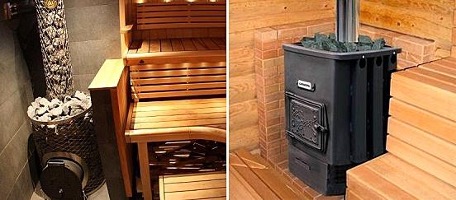
Wood-burning sauna stove cast iron or steel: comparison
Wood-burning sauna stoves made of cast iron and steel have their own unique characteristics, and the choice between them depends on a number of factors, including personal preference, budget and operating conditions.
Cast iron stoves are characterized by high heat capacity and the ability to retain heat for a long time after the end of the fire. This makes them an ideal choice for long sauna sessions. Cast iron heats up slowly, but also cools down slowly, providing stable and uniform heat transfer. Cast iron stoves are also more resistant to corrosion and wear, making them more durable.However, they are heavier and more expensive than steel stoves, and also require more careful handling, since cast iron is a more brittle material.
Steel stoves, on the other hand, heat up quickly and cool down just as quickly. This makes them suitable for small baths or for situations where rapid heating of the room is necessary. Steel stoves are usually lighter and less expensive than cast iron, and can also have a more modern appearance. However, steel is less resistant to corrosion and can wear out faster, especially with heavy use.
Thus, when choosing a wood-burning stove for a sauna, it is important to consider the following aspects:
- for long-term and regular use of baths, cast iron stoves are preferable;
- if you need quick heating, steel stoves are the best choice;
- steel stoves are usually more affordable;
- steel stoves are lighter and easier to install compared to cast iron.
Depending on these criteria, you can make an informed choice between a cast iron and a steel wood-burning sauna stove.
Cast iron for a heater in a bathhouse: features of choice
Cast iron for a sauna heater is a classic choice due to its ability to accumulate heat and release it slowly. When choosing a cast iron heater, it is important to consider the quality of the cast iron, the size of the heater and its design to ensure optimal heat and steam distribution.
Conclusion
Choosing a stove for a bath is a responsible decision that should be based on careful weighing of all the pros and cons of both cast iron and steel stoves. Taking into account the individual characteristics of the bath and personal preferences, you can choose the best option that will provide comfortable and safe bath procedures for many years.

